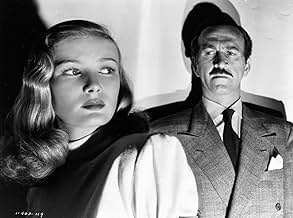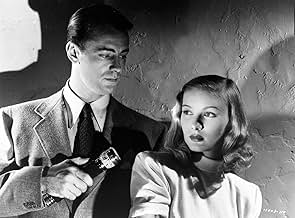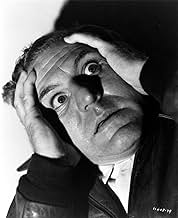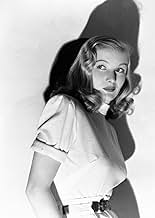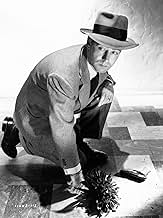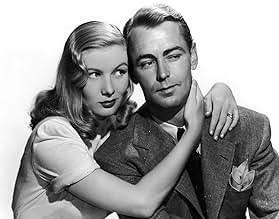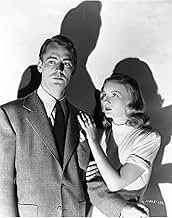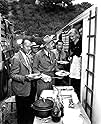CALIFICACIÓN DE IMDb
7.1/10
10 k
TU CALIFICACIÓN
Un ex piloto de bombarderos es sospechoso de asesinar a su esposa infiel.Un ex piloto de bombarderos es sospechoso de asesinar a su esposa infiel.Un ex piloto de bombarderos es sospechoso de asesinar a su esposa infiel.
- Nominado a 1 premio Óscar
- 1 premio ganado y 1 nominación en total
Bea Allen
- News Clerk
- (sin créditos)
Harry Barris
- Bellhop
- (sin créditos)
George Barton
- Cab Driver
- (sin créditos)
Mary Bayless
- Bar Patron
- (sin créditos)
Edward Biby
- Restaurant Patron
- (sin créditos)
Nina Borget
- Mexican Waitress
- (sin créditos)
- Dirección
- Guionista
- Todo el elenco y el equipo
- Producción, taquilla y más en IMDbPro
Opiniones destacadas
Blue Dahlia, The (1946)
** 1/2 (out of 4)
Alan Ladd plays a pilot returning home after serving in WWII only to discover that his wife has been cheating on him. The wife ends up dead and Ladd is the main suspect so he takes off to prove his innocence and this is when he meets the wife (Veronica Lake) of the man who was having an affair with his wife. This film has the reputation of being a classic but I wouldn't hold it up that high as I found some of the plot to be rather boring and many scenes stretched out too long. With that said, the film does offer up some nice performances and fans of noir will probably want to check it out. I think the main reason to watch the film is for the performance of Ladd. He manages to be very believable in the role and I loved how laid back he was no matter what was going on. He could be flirting with Lake or fighting off some thugs but he remains the same level of calmness throughout. As for Lake, I wouldn't say she gives a good performance but she fits her role just fine. William Bendix and Hugh Beaumont play Ladd's buddies who also return home with him. I found Bendix to be quite good in his role, although I think the "monkey music" dialogue gets a bit old. Howard Da Silva, Howard Freeman, Doris Dowling and Tom Powers do nice work as well. The film contains some pretty good cinematography and director Marshall is able to build up a nice atmosphere throughout. The biggest problem I had with the film is that it really doesn't try to be anything that we haven't seen before. The dialogue isn't the strongest and it's pretty obvious who the killer is from the first time we see him. That is, the original killer. The studio changed the ending of the film and the new killer doesn't work at all and it comes across incredibly forced and stupid. So, either way, the ending really doesn't work because had they kept the original killer then it was way too obvious. The way they changed the killer comes off very silly. Either way, Ladd makes the film worth viewing at least once.
** 1/2 (out of 4)
Alan Ladd plays a pilot returning home after serving in WWII only to discover that his wife has been cheating on him. The wife ends up dead and Ladd is the main suspect so he takes off to prove his innocence and this is when he meets the wife (Veronica Lake) of the man who was having an affair with his wife. This film has the reputation of being a classic but I wouldn't hold it up that high as I found some of the plot to be rather boring and many scenes stretched out too long. With that said, the film does offer up some nice performances and fans of noir will probably want to check it out. I think the main reason to watch the film is for the performance of Ladd. He manages to be very believable in the role and I loved how laid back he was no matter what was going on. He could be flirting with Lake or fighting off some thugs but he remains the same level of calmness throughout. As for Lake, I wouldn't say she gives a good performance but she fits her role just fine. William Bendix and Hugh Beaumont play Ladd's buddies who also return home with him. I found Bendix to be quite good in his role, although I think the "monkey music" dialogue gets a bit old. Howard Da Silva, Howard Freeman, Doris Dowling and Tom Powers do nice work as well. The film contains some pretty good cinematography and director Marshall is able to build up a nice atmosphere throughout. The biggest problem I had with the film is that it really doesn't try to be anything that we haven't seen before. The dialogue isn't the strongest and it's pretty obvious who the killer is from the first time we see him. That is, the original killer. The studio changed the ending of the film and the new killer doesn't work at all and it comes across incredibly forced and stupid. So, either way, the ending really doesn't work because had they kept the original killer then it was way too obvious. The way they changed the killer comes off very silly. Either way, Ladd makes the film worth viewing at least once.
My recording off UK Channel 4 13th Feb 1987 is nearing its end cycle, hopefully the next time I want to trot this episodic classic out it'll be on DVD. Because it was Chandler I always regarded it maybe too highly, but it certainly has some powerful noir-ish moments whilst remaining essentially a normal Paramount studio-bound potboiler.
War vet Alan Ladd comes home to find his wife playing around, gets accused of murdering her while being picked up by Veronica Lake. They indulged in some snappy laconic Chandler-banter but that's as far as their relationship seemed to progress. Murder and mayhem follow Ladd while monkey-music followed his buddy William Bendix. I always wondered: how on Earth did Buzz settle down afterwards, especially when rock & roll came? Everyone has angles or axes to grind, is edgy, dislikeable, seedy or all three, the house-peeper particularly coming in for a lot of stick. Some savage and clunky fight scenes might surprise especially at the Old Cabin when juxtaposed with the romantic nightclub scene. The atmosphere throughout is perfect as was only possible on nitrate film stock. The only thing I never liked was at the climax after Hendrickson asks "You didn't think you were going to walk out that door did you?" - a heavily contrived and swift ending follows.
It was a stranger to me a long time ago, but has been a firm friend of mine for decades now. Did the horticulturists ever succeed in creating a real blue dahlia?
War vet Alan Ladd comes home to find his wife playing around, gets accused of murdering her while being picked up by Veronica Lake. They indulged in some snappy laconic Chandler-banter but that's as far as their relationship seemed to progress. Murder and mayhem follow Ladd while monkey-music followed his buddy William Bendix. I always wondered: how on Earth did Buzz settle down afterwards, especially when rock & roll came? Everyone has angles or axes to grind, is edgy, dislikeable, seedy or all three, the house-peeper particularly coming in for a lot of stick. Some savage and clunky fight scenes might surprise especially at the Old Cabin when juxtaposed with the romantic nightclub scene. The atmosphere throughout is perfect as was only possible on nitrate film stock. The only thing I never liked was at the climax after Hendrickson asks "You didn't think you were going to walk out that door did you?" - a heavily contrived and swift ending follows.
It was a stranger to me a long time ago, but has been a firm friend of mine for decades now. Did the horticulturists ever succeed in creating a real blue dahlia?
"The Blue Dahlia" is a flower and a nightclub, both of which figure in the plot of this 1946 film starring Alan Ladd, Veronica Lake, William Bendix and Howard da Silva. There's plenty of the busy, somewhat chaotic post-war atmosphere in this movie as war pals Johnny Morrison (Ladd), Buzz Wanchek (Bendix) and George Copeland (Hugh Beaumont) return from service. While the brain-damaged Buzz and Copeland get an apartment together, Morrison returns to his beautiful wife (Doris Dowling) whom he finds has been living a wild, party-filled existence and cheating on him with club owner Eddie Harwood (da Silva). Hurt and angry, Morrison, trying to get a cab in the rain, is picked up by none other than a beautiful blond named Joyce, who he does not know is actually Mrs. Harwood. After parting company, they both stay at the same inn without realizing it. The next morning, Morrison hears on the radio that his wife is dead, and the police are looking for him. On the run, and with some help from Joyce, Morrison tries to find out who really killed his wife.
This is a pretty good noir with a solid, effective performance from Ladd and excellent work by both Bendix and da Silva. There are plenty of suspects, too - viewers will have their pick. Though "The Blue Dahlia" is a decent noir, it's the frenetic post-war energy that makes it watchable rather than the story, which as one reviewer here pointed out, has the strange coincidence of Johnny being picked up by Mrs. Harwood. The other odd thing to this viewer, anyway, is the fact that the Bendix character is so obviously brain-damaged from the war (he has a plate in his head), yet no one seems to really pick up on it, or at least acknowledge it, until later in the film. He's told to pull himself together and allowed to drink. Meanwhile, loud music drives him nearly insane, and he suggests getting on a bus, not remembering he just got off of it.
The Veronica Lake role is criticized - it's true she doesn't have much to do; it's also true that not many people liked working with her; and that she wasn't the world's greatest actress (Raymond Chandler called her Moronica), but she and Ladd made a great, if short, team, and she was always beautiful to look at and listen to.
All in all, worth watching for one of the great noir teamings and some good performances.
This is a pretty good noir with a solid, effective performance from Ladd and excellent work by both Bendix and da Silva. There are plenty of suspects, too - viewers will have their pick. Though "The Blue Dahlia" is a decent noir, it's the frenetic post-war energy that makes it watchable rather than the story, which as one reviewer here pointed out, has the strange coincidence of Johnny being picked up by Mrs. Harwood. The other odd thing to this viewer, anyway, is the fact that the Bendix character is so obviously brain-damaged from the war (he has a plate in his head), yet no one seems to really pick up on it, or at least acknowledge it, until later in the film. He's told to pull himself together and allowed to drink. Meanwhile, loud music drives him nearly insane, and he suggests getting on a bus, not remembering he just got off of it.
The Veronica Lake role is criticized - it's true she doesn't have much to do; it's also true that not many people liked working with her; and that she wasn't the world's greatest actress (Raymond Chandler called her Moronica), but she and Ladd made a great, if short, team, and she was always beautiful to look at and listen to.
All in all, worth watching for one of the great noir teamings and some good performances.
Raymond Chandler wrote this script and it is him through and through, I think. It's a very bleak tale of returning war veterans' findings when they reach "home." Unfaithful wife, hoodlums, and just general corruption and bleakness. The scenes with Veronica Lake are the shafts of light in this one's blackness (what did you expect, she's Veronica Lake, one of the most beautiful screen starlet ever), but all in all it conjours up dark images in one's mind. I once heard someone argue that this wasn't film noir. I disagree as much as I can. There is much inner struggle in the characters, settings of bleakness, amnesia, corruption everywhere, unfaithful spouses, murders, cops, criminals, and finally the dark visual expression (with rain as an added bonus). Do not miss this film.
The Blue Dahlia is directed by George Marshall and written by Raymond Chandler. It stars Alan Ladd, Veronica Lake, William Bendix & Howard Da Silva. Plot sees Ladd playing a navy officer who returns home to his unfaithful wife after fighting in the South Pacific. When she is found murdered he is the number one suspect, he must find who is responsible before it's too late.
Legend has it that Paramount Pictures were so pleased about the success of Double Indemnity, and in particular Raymond Chandler's writing on it, they handed the writer a contract, where, he produced this tightly wound film noir piece. Nominated for an Academy Award, Chandler had in fact had to give up his teetotaller way of life (he was a recovering alcoholic) so as to gain inspiration for the story. Also of note is that his original ending was shelved after objections by the U.S. Military Department, shame, because I believe that an already good film could have been a better one with Chandler's original denouement. Oh well, what's left is still rather rewarding to the genre faithful.
After This Gun for Hire and The Glass Key, this was the third pairing of Alan Ladd & Veronica Lake. Their working chemistry set in stone, it's nice that the film doesn't solely rely on the pair to make Chandler's material work. True enough their scenes have a tenderness to them, acting as a sort of warm place to go to when the harsher aspects in the plot hit home hard, but the film is far more than just the Ladd & Lake show. What marks it out as a worthy point of reference in the film noir cycle, is that it delves into the psyche of the servicemen returning home from the war. Observing how they were being received and showing that some of them also carried emotional scars as well as those ones gained in battle. Then Chandler mixes it in with a hard-boiled murder investigation as our wrongly accused protagonist trawls the mean streets of L.A. searching to clear his name. With that comes grungy premises' and periods of brutal violence, all cloaked moodily by the competent Marshall. Ladd does good work, very appealing yet tough, but it's Bendix who steals the movie with an intense portrayal of an ex serviceman with psychological issues.
With the original ending and a deeper exploration of the war veterans not being warmly received on homecoming, The Blue Dahlia would have been close to being a genre classic. The script and Bendix ensure, tho, that it's still very easy to recommend to like minded fans of the genre and its dark alley offshoots. 7.5/10
Legend has it that Paramount Pictures were so pleased about the success of Double Indemnity, and in particular Raymond Chandler's writing on it, they handed the writer a contract, where, he produced this tightly wound film noir piece. Nominated for an Academy Award, Chandler had in fact had to give up his teetotaller way of life (he was a recovering alcoholic) so as to gain inspiration for the story. Also of note is that his original ending was shelved after objections by the U.S. Military Department, shame, because I believe that an already good film could have been a better one with Chandler's original denouement. Oh well, what's left is still rather rewarding to the genre faithful.
After This Gun for Hire and The Glass Key, this was the third pairing of Alan Ladd & Veronica Lake. Their working chemistry set in stone, it's nice that the film doesn't solely rely on the pair to make Chandler's material work. True enough their scenes have a tenderness to them, acting as a sort of warm place to go to when the harsher aspects in the plot hit home hard, but the film is far more than just the Ladd & Lake show. What marks it out as a worthy point of reference in the film noir cycle, is that it delves into the psyche of the servicemen returning home from the war. Observing how they were being received and showing that some of them also carried emotional scars as well as those ones gained in battle. Then Chandler mixes it in with a hard-boiled murder investigation as our wrongly accused protagonist trawls the mean streets of L.A. searching to clear his name. With that comes grungy premises' and periods of brutal violence, all cloaked moodily by the competent Marshall. Ladd does good work, very appealing yet tough, but it's Bendix who steals the movie with an intense portrayal of an ex serviceman with psychological issues.
With the original ending and a deeper exploration of the war veterans not being warmly received on homecoming, The Blue Dahlia would have been close to being a genre classic. The script and Bendix ensure, tho, that it's still very easy to recommend to like minded fans of the genre and its dark alley offshoots. 7.5/10
¿Sabías que…?
- TriviaThe pressure of having to finish the screenplay combined with the curveball of having to write an entirely new ending was too much for Raymond Chandler. He quickly came down with a severe case of writer's block. According to a near-legendary story, Chandler offered to finish the screenplay by working drunk; in exchange for sacrificing his health to produce the requisite pages on time, Chandler was permitted to work at home (a privilege rarely granted to screenwriters) and was provided two chauffeured cars, one to convey the completed pages to the studio and the other for his wife. Chandler turned the script in on time. Many now believe the drunkenness was simply a ruse by Chandler to wrangle extraordinary privileges from the desperate studio.
- ErroresJoyce tells Johnny that the tide is out. Clearly the tide is all the way in, completely covering the beach.
- Citas
Joyce Harwood: Well, don't you even say 'Good night'?
Johnny Morrison: It's "good-bye", and it's tough to say good-bye.
Joyce Harwood: Why is it? You've never seen me before tonight.
Johnny Morrison: Every guy's seen you before somewhere. The trick is to find you.
- ConexionesFeatured in The Hollywood Collection: Alan Ladd: The True Quiet Man (1999)
Selecciones populares
Inicia sesión para calificar y agrega a la lista de videos para obtener recomendaciones personalizadas
- How long is The Blue Dahlia?Con tecnología de Alexa
Detalles
Taquilla
- Total en EE. UU. y Canadá
- USD 2,700,000
- Tiempo de ejecución1 hora 36 minutos
- Color
- Relación de aspecto
- 1.33 : 1
Contribuir a esta página
Sugiere una edición o agrega el contenido que falta


